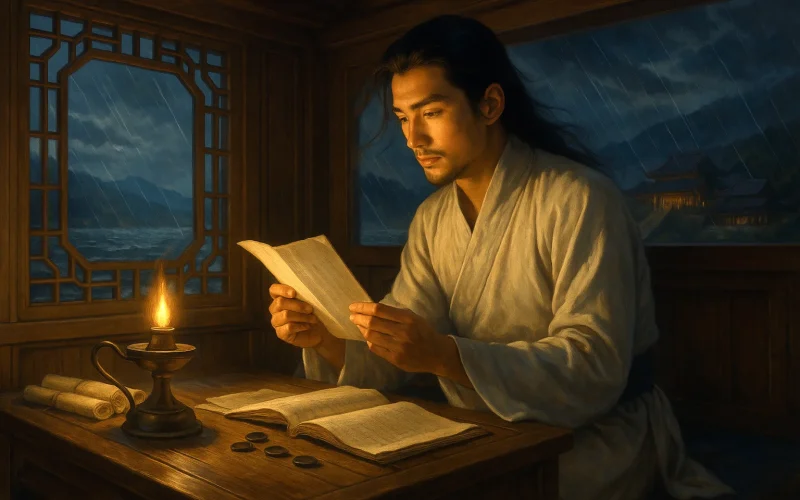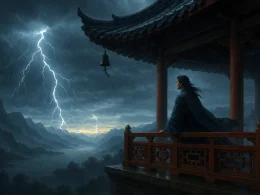Waterside reeds are covered with hoarfrost at night;
The green mountains are drowned in the cold blue moonlight.
Who says a thousand miles will separate us today?
My dream will follow you though you are far away.
Original Poem
「送友人」
薛涛
水国蒹葭夜有霜,月寒山色共苍苍。
谁言千里自今夕,离梦杳如关塞长。
Interpretation
This work "Farewell to a Friend" was composed by Xue Tao during the Tang Dynasty as a parting gift. Blending melancholic scenery with delicate emotion, it reveals the distinctive tenderness and depth of feminine sentiment. In just four lines, it captures both the desolate atmosphere of an autumn night farewell and the sorrow of uncertain reunion. By incorporating imagery from The Book of Songs, it revitalizes the conventional farewell theme with fresh subtlety.
First Couplet: « 水国蒹葭夜有霜,月寒山色共苍苍。 »
Shuǐ guó jiānjiā yè yǒu shuāng, yuè hán shān sè gòng cāngcāng.
Reeds in watery realms frost under night's veil, Moon-chilled mountains merge with endless pale.
The opening couplet establishes the scene with "night frost" and "cold moon," crafting an autumnal parting atmosphere. "Reeds in watery realms" (水国蒹葭) alludes to The Book of Songs' "The Reeds" (蒹葭), evoking the classic longing for "the one beyond the water." Frost, moonlight, and mountain hues intertwine to mirror the loneliness of separation.
Second Couplet: « 谁言千里自今夕,离梦杳如关塞长。 »
Shéi yán qiān lǐ zì jīn xī, lí mèng yǎo rú guān sài cháng.
Who claims a thousand miles begin tonight? Even reunion dreams grow distant as frontier passes' height.
Transitioning from scene to sentiment, this couplet questions the notion that parting starts "tonight"—implying the pain of indefinite separation. "Dreams of reunion" (离梦), vague as distant frontier passes (关塞), blend reality and fantasy, deepening the poignancy.
Artistic Merits
- Classical Allusion, Layered Meaning: The reed imagery from The Book of Songs enriches the autumn scene while invoking cultural nostalgia.
- Scene-Emotion Fusion: From night frost to boundless frontiers, the poem progresses from stillness to introspection, each layer intensifying the farewell's weight.
- Subtlety and Resonance: Without explicit grief, lines like "reunion dreams grow distant" convey longing through metaphor, leaving space for reader reflection.
- Symbolic Nature: Reeds, frost, and moon transcend description to become emotional vessels—cold yet tender, silent yet eloquent.
Holistic Appreciation
Farewell to a Friend distills profound feeling into sparse language. Xue Tao's feminine sensitivity merges personal sorrow with classical motifs, crafting a parting scene both intimate and universal. The reeds' shadow, the frost's bite, and the frontier's expanse compose a scroll of quiet heartbreak—brief in form but infinite in resonance, standing among the finest farewell poems.
Insights
The poem teaches that depth need not declaim; truth can dwell in the unsaid. When faced with life's inevitable separations, we might channel Xue Tao's art: let nature and culture carry what words cannot, and temper sorrow with beauty. Her voice—gentle but enduring—offers a timeless model: to speak through silence, and mean beyond saying.
Poem translator
Xu Yuanchong (许渊冲)
About the poet

Xue Tao 薛涛 (c. 768–832), a Tang Dynasty poetess styled Hongdu (洪度), was born in Chang'an (present-day Xi'an, Shaanxi). The daughter of official Xue Yun (薛郧), she relocated to Sichuan and later settled in Chengdu after her father's death. Though she composed over 500 poems in her lifetime, only around 90 survive today - a profound cultural loss. Her symbolic poetry often expressed yearnings for purity and moral integrity through natural imagery.











